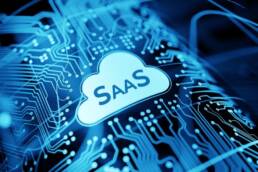The enterprise software as a service (SaaS) market is constantly evolving. Businesses are constantly looking for new ways to improve their efficiency, customer experience, and decision-making. Machine learning (ML) is playing a major role in this evolution.
ML-powered SaaS applications are able to automate tasks, provide personalized recommendations, and improve decision-making. This is leading to a number of benefits for businesses, including:
- Increased efficiency: ML can automate tasks that were previously done manually, freeing up employees to focus on more strategic work. For example, ML can be used to automate customer service tasks, such as responding to emails and chat messages. This can free up customer service representatives to focus on more complex issues, such as resolving customer complaints. ML can also be used to automate data entry tasks, such as entering product information into a database. This can save businesses time and money.
- Improved customer experience: ML can be used to personalize customer experiences, providing each customer with the information and products that they are most likely to be interested in. For example, ML can be used to recommend products to customers based on their past purchases. This can help businesses to increase sales and improve customer satisfaction. ML can also be used to provide customers with personalized support, such as recommending articles or videos that are relevant to their interests. This can help businesses to build stronger relationships with their customers.
- Better decision-making: ML can be used to analyze data and identify trends, which can help businesses to make better decisions about everything from product development to marketing campaigns. For example, ML can be used to analyze customer data to identify new product opportunities. This can help businesses to stay ahead of the competition and grow their market share. ML can also be used to analyze marketing data to identify the most effective marketing channels. This can help businesses to improve their return on investment (ROI) from marketing campaigns.
As a result of these benefits, ML-powered SaaS applications are becoming increasingly popular with businesses of all sizes. In fact, a recent study by Gartner found that 70% of businesses plan to adopt ML-powered SaaS applications by 2023.
If you are a business that is looking to stay ahead of the curve, you need to consider adopting ML-powered SaaS applications. ML can help you to improve your efficiency, customer experience, and decision-making. This will give you a competitive advantage and help you to grow your business.
Here are some of the ways that ML is revolutionizing the enterprise SaaS market in more detail:
- Automating tasks: ML is being used to automate a wide variety of tasks in the enterprise SaaS market. For example, ML is being used to automate customer service tasks, such as responding to emails and chat messages. ML is also being used to automate data entry tasks, such as entering product information into a database. This is leading to increased efficiency and productivity for businesses.
- Personalizing customer experiences: ML is being used to personalize customer experiences in the enterprise SaaS market. For example, ML is being used to recommend products to customers based on their past purchases. ML is also being used to provide customers with personalized support, such as recommending articles or videos that are relevant to their interests. This is leading to increased customer satisfaction and loyalty for businesses.
- Improving decision-making: ML is being used to improve decision-making in the enterprise SaaS market. For example, ML is being used to analyze customer data to identify new product opportunities. ML is also being used to analyze marketing data to identify the most effective marketing channels. This is leading to increased profitability and growth for businesses.
If you are a business that is looking to adopt ML-powered SaaS applications, here are a few things to keep in mind:
- Start small: Don’t try to implement ML in all of your applications at once. Start with a few key applications where ML can have the biggest impact. This will help you to get a feel for how ML can work for your business and to avoid making any major mistakes.
- Get the right data: ML applications need data to learn and improve. Make sure that you have access to the right data before you start implementing ML. This could be data from your own customers, data from public sources, or a combination of both.
- Find the right partner: There are a number of companies that can help businesses to adopt ML-powered SaaS applications. Find a partner that has the expertise and experience to help you get the most out of ML.
The future of enterprise SaaS is bright. ML is playing a major role in the evolution of the market and is leading to a number of benefits for businesses. If you are a business that is looking to stay ahead of the curve, you need to consider adopting ML-powered




